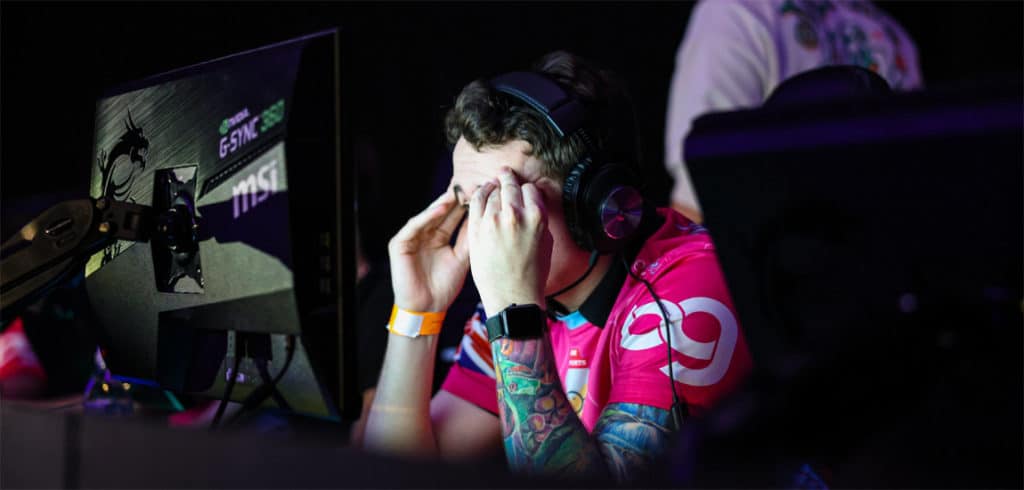FlawlesSlays of Grannys Knockers at Epic 40 (photo credit: @Sophie_skittle)
A new study has explored how Counter-Strike (CS) esports players handle stress in high-pressure situations, and how it impacts their performance.
It analysed 33 competitors (five teams including subs) preparing for the ESL Premiership Spring 2022 UK & Ireland tournament, and 57 students from the UK who’ve competed in more than two university CSGO tournaments. Of the ESL Prem players, four were female, and of the students, 19 were female.
The study found that while players were ‘unable to cope effectively with the negative influence of stress’, the ESL Prem players handled the stressful situations better than university players – perhaps unsurprising given the Prem players will generally have more experience than students.
The research was a collaborative effort between the University of Chichester’s Institute of Psychology, Business, and Human Sciences and the Institute of Applied Sciences, as well as the University of Bath.
In the first experiment, 90 participants completed an esport task in CS under both low- and high-pressure conditions while anxiety, appraisals, gaze and performance were assessed.
“Participants reported higher anxiety, threat appraisals, and displayed suboptimal gaze behaviour and poorer performance in the high-pressure condition than the low-pressure condition, and effects were stronger for university- than national-level competitors,” the study found.
In the second experiment, the same task was repeated to 28 ESL Prem players only, but with increased pressure, with the inclusion of a live audience, feedback between rounds, and audience reactions. This experiment also assessed cognitive effort via pupillometry (i.e. the change in pupil diameter).
The report stated:
“Despite investing more cognitive effort, participants reported heightened anxiety, displayed suboptimal gaze behaviour, and exhibited poorer performance under the high-pressure condition when compared to the low-pressure condition.”
“We may tentatively suggest that while greater resources were invested into the pressure condition, the national competitors were unable to cope effectively with the negative influence of stress.
“In line with pertinent theory (e.g. Integrative Framework of Stress, Attention, and Visuomotor Performance), the findings suggest that esport performance might breakdown under pressure due to elevated anxiety, threat appraisals, and disrupted gaze behaviour, even when more cognitive effort is mobilised.”
The study hopes to be of value to coaches and sport psychologists, in terms of helping them assist esports players to perform better and optimise performance by reducing anxiety, boosting coping resources and maintaining their focus.
It stated that ‘the rigours of competition, which include audience expectations, competitive leaderboards and team demands, can significantly influence how individuals perceive cognitive and physiological symptoms of anxiety’.
Dr Benjamin T. Sharpe, special issue lead Guest Editor and Lecturer in Cognitive Psychology explains: “Ongoing research endeavours employing a combination of methodologies persist in examining this subject, underscoring its pivotal role in safeguarding the enduring viability of esports and gaming, the players involved, and the sustainability of their professional careers.”
For more from the study, you can check out the full report, ‘Performance Breakdown Under Pressure Among Esports Competitors’, here. It’s also been published in the American Psychological Association’s Sports, Exercise, and Performance Psychology journal.
Journal of Electronic Gaming and Esports to publish special issue around pressure in esports
Update (January 12th 2024): To build on the prior stress and pressure related research conducted at the University of Chichester in 2019, 2022, and now 2023, a special issue titled ‘Psychology in esports: breakdown under pressure’ will be published in the Journal of Electronic Gaming and Esports (JEGE).
This intends to ‘close the gap in the lack of experiments, longitudinal research and interventional studies needed to explore the psychological impact of competition and pressure in a range of contexts’.
Interested authors are required to submit their manuscripts by May 13th 2024, and submit through ScholarOne: https://mc.manuscriptcentral.com/hk_jege.
Limitations and Future Directions
It’s worth bearing in mind this is one study, and there may be different results from future research.
The study said: “Using a more representative measure of in-game performance (e.g. win:loss ratio during a tournament) may have promoted replication of existing research.
“Furthermore, perhaps our mediation findings demonstrate that each variable of interest may be influenced by pressure but have no influence on performance (as determined by th experimental task) itself. Future research should certainly investigate the mediators that influence such a stress-performance relationship.
“Also, the perception of pressure was not measured before or after every round (e.g. state anxiety). Participants may have only perceived the task as stressful in the initial round and subsequently experienced less stress soon after. Despite our successful manipulation checks, future investigations may wish to further emphasize the stressor instructions across all condition trials to ensure the consistent influence of the manipulation.”
It also stated that checking the heart rate of players may result in different findings, and that it doesn’t claim to have replicated ‘true stressors’ experienced by players in a tournament setting or in CSGO matchmaking, and that ‘an individual’s ability to simply perform a series of actions or skills and not elicit the same process-tracing behaviours as competitive scenarios’.
New study follows similar reports on stress in esports: ‘This will hopefully assist esports players in enhancing their performance’
The news comes after other similar reports were published by the University of Chichester, including its first one on esports pressure in 2019, which found that pro esports players ‘face the same psychological pressure as physical athletes’.
And, perhaps a little confusingly, two years ago, CSGO was apparently found to be the most stress-relieving shooter, according to a separate University of Leeds study on heart rates and blood pressure.
On the new study, Dr Phil Birch, Senior Lecturer in Sport and Exercise Psychology at the University of Chichester, said: “Building on our previous research, our study harnesses both subjective and objective psychophysiological measures of stress to advance our understanding of the impact of pressure on esports performance.
“Our paper is very timely given the focus of next year’s European Congress of Sport and Exercise Psychology (FEPSAC) where the impact of pressure on performance is the central theme. I’m looking forward to present our findings to an international audience of scholars.”
Dr Benjamin T. Sharpe, the report’s lead author and Lecturer in Cognitive Psychology, added: “The study will hopefully contribute to the scientific pursuit of assisting esports players in enhancing their performance during critical moments, including strategies to mitigate anxiety, enhance coping abilities, and sustain optimal control over attention.”
The University of Chichester offers a BA (Hons) Esports undergraduate degree which recently saw its second cohort graduate.
Students on the three-year course learn in the uni’s £35m Tech Park and cover the physical and psychological impacts of esports, including nutrition, coaching and strategy. The course is led by one of the UK’s first pro gamers, Rams Singh.
Other related articles
- ‘Interventions are needed’ to improve esports athletes’ quality of sleep and mental health, according to UK study of student players
- Pro player study explores stress and coping in League of Legends
- Chi Invitational: Student-run Valorant event ‘a great practical introduction into the world of esports event production’

Dom is an award-winning writer and finalist of the Esports Journalist of the Year 2023 award. He graduated from Bournemouth University with a 2:1 degree in Multi-Media Journalism in 2007.
As a long-time gamer having first picked up the NES controller in the late ’80s, he has written for a range of publications including GamesTM, Nintendo Official Magazine, industry publication MCV and others. He worked as head of content for the British Esports Federation up until February 2021, when he stepped back to work full-time on Esports News UK and offer esports consultancy and freelance services. Note: Dom still produces the British Esports newsletter on a freelance basis, so our coverage of British Esports is always kept simple – usually just covering the occasional press release – because of this conflict of interest.



